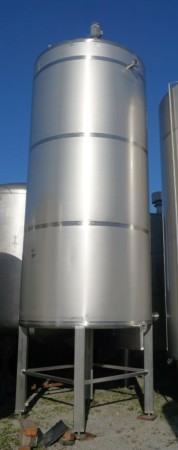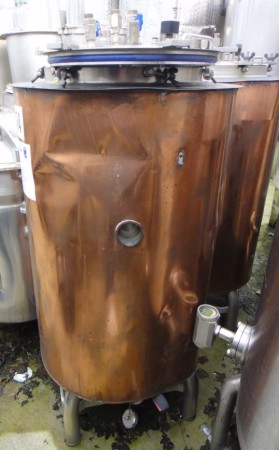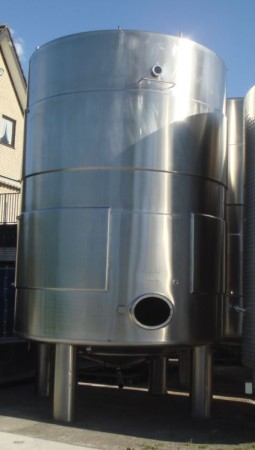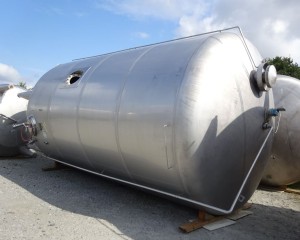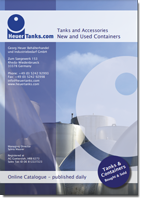Fermentation tank for foodstuffs
Fermentation tank
Container 11.000 liters made of V2A, used, single-walled
Art.-Nr. M-1213
EUR 5.200,00
add. 19 % VAT excl. shipping costs
Behälter 11.000 Liter aus V2A, gebraucht, einwandig
EUR 5.200,00
add. 19 % VAT excl. shipping costs
Container 15.310 liters made of V2A, used, temperature-controllable, single-walled
Art.-Nr. M-2065
EUR 6.800,00
add. 19 % VAT excl. shipping costs
Behälter 15.310 Liter aus V2A, gebraucht, temperierbar, einwandig
EUR 6.800,00
add. 19 % VAT excl. shipping costs
Container 16.000 liters made of V2A, used, temperature-controllable, isolated
Art.-Nr. M-2045
EUR 16.300,00
add. 19 % VAT excl. shipping costs
Behälter 16.000 Liter aus V2A, gebraucht, temperierbar, isoliert
EUR 16.300,00
add. 19 % VAT excl. shipping costs
Container 18.500 liters made of V2A, used, temperature-controllable, single-walled
Art.-Nr. M-2204
EUR 11.200,00
add. 19 % VAT excl. shipping costs
Behälter 18.500 Liter aus V2A, gebraucht, temperierbar, einwandig
EUR 11.200,00
add. 19 % VAT excl. shipping costs
Container 180 liters made of V2A, isolated, temperature-controllable, used
Art.-Nr. M-1389
EUR 980,00
add. 19 % VAT excl. shipping costs
Behälter 180 Liter aus V2A, isoliert, temperierbar, gebraucht
EUR 980,00
add. 19 % VAT excl. shipping costs
Container 26.521 liters made of V2A, temperature-controllable, used
Art.-Nr. M-1073
EUR 12.200,00
add. 19 % VAT excl. shipping costs
Behälter 26.521 Liter aus V2A, temperierbar, gebraucht
EUR 12.200,00
add. 19 % VAT excl. shipping costs
Container 4.000 liters made of V2A, used, single-walled
Art.-Nr. M-2208
EUR 1.900,00
add. 19 % VAT excl. shipping costs
Behälter 4.000 Liter aus V2A, gebraucht, einwandig
EUR 1.900,00
add. 19 % VAT excl. shipping costs
Container 43.000 liters aus V2a, single-walled
Art.-Nr. M-2202
EUR 17.000,00
add. 19 % VAT excl. shipping costs
Behälter 43.000 Liter aus V2a, einwandig
EUR 17.000,00
add. 19 % VAT excl. shipping costs
Container 47.200 liters made of V2A single-walled
Art.-Nr. M-2240
EUR 21.500,00
add. 19 % VAT excl. shipping costs
Behälter 47.200 Liter aus V2A einwandig
EUR 21.500,00
add. 19 % VAT excl. shipping costs
Durckbehälter 490 liters made of V2A, used, temperature-controllable, isolated
Art.-Nr. M-1661
EUR 2.100,00
add. 19 % VAT excl. shipping costs
Durckbehälter 490 Liter aus V2A, gebraucht, temperierbar, isoliert
EUR 2.100,00
add. 19 % VAT excl. shipping costs
Fermentation tank
A fermentation tank is very similar to an anaerobic digestion tank and has many of the same features. Fermentation tanks are used in beer brewing and wine production and can be stored horizontally or vertically according to how they’re used.
Fermentation tanks in beer brewing
In beer brewing, the fermentation tank takes on a very important role. In the brewing process, the yeast is added to the fermentation tank and the beer, i.e. the slurry, begins to brew. It is then stored or bottled. This is the last significant step in beer production.
Fermentation tanks in wine production
Fermentation tanks are also essential to wine production. The must, consisting of the pressed grapes, can be heated during the fermentation process, which lasts several days. So, many fermentation tanks have a temperature regulator for producing wine. The colder the fermentation process is, the lighter the wine at the end.
Many winemakers don’t leave the fermentation process to chance and take control of it by regulating the temperature. White wine usually ferments at seven to ten degrees. Red wine can be fermented at up to 20 degrees.
Fermentation tanks = pressure tanks?
Pressure will generally build up in an fermentation tank due to the digestion process, which said tank must be able to withstand. Therefore, a fermentation tank can also be called a pressure tank. The fermentation tank must withstand the pressure and not yield even at high pressures. So, when purchasing a tank that you intend to use as a fermentation tank, you should also pay attention to its stability. Furthermore, the tank should have equipment for equalising pressure.
Cleaning and operation
Fermentation tanks are mainly used in the food industry. For this reason, hygiene and cleanliness play a significant role, particularly when a tank is used for different varieties of beer, etc. Residue needs to be removed and not affect subsequent production.
The CIP method for effective cleaning
The CIP method is an effective method for cleaning fermentation tanks that are part of a production loop. Cleaning in process is an effective way of cleaning tanks and their equipment without taking them out of the production loop. The cleaning process can be completed in a single pass. This does away with the need for tediously taking the production loop apart and putting it back together, which in turn prevents individual parts from being lost or damaged. Thanks to this cleaning method being so thorough all residue is removed, allowing the fermentation tank to be put back into operation without issue. The CIP method also increases the lifespan of the tanks.
We’d be happy to advise you! We’re experts in tanks and are passionate when it comes to selling you your perfect tank.





